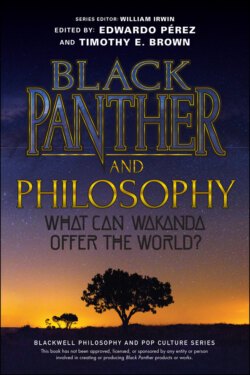Читать книгу Black Panther and Philosophy - Группа авторов - Страница 37
“Y’all Sittin’ up Here Comfortable. Must Feel Good.”
ОглавлениеWakanda is portrayed as an extreme isolationist state – a state that does not engage with other states. It is not just that Wakanda remains neutral in war, like, for example, Switzerland, but that it does not engage at all with trade, cooperative ventures, human rights enforcement, and so on. We are provided with a few reasons for this isolation, and the most pressing seems to be the protection of the valuable knowledge and technology that could be used for evil if in the wrong hands. For example, when talking to Killmonger, T’Challa explicitly states that his responsibility is to ensure that “vibranium does not fall into the hands of a person like you.” It is not clear why this necessarily involves keeping the technology secret rather than well protected. Nevertheless, it is an underlying theme throughout the film that if outsiders were to know of the technology it would lead to war and destruction.
Perhaps bearing witness to colonial epistemicide around them stoked Wakandans’ strong impulse to protect their knowledge at all costs. Other reasons offered speak more directly to the typical way of life of a resident of Wakanda and the desire to protect it from a reality of foreigners visiting and becoming dependent on them. As W’Kabi says to T’Challa: “Foreign aid, refugee programs. You let refugees in, they bring their problems with them. And then Wakanda is like everywhere else.”
The people of Wakanda appear to have a classic “us vs. them” attitude. Even those who wish to do something about the injustices of the world appear to view it as a case of us, Wakanda, protecting, aiding, and cleaning up after outsiders. For example, Nakia wants T’Challa to provide aid, but her framing of the issue still implies an “us vs. them” perspective. There is also T’Challa’s view that Wakanda cannot judge people who are “not their own,” which is a slightly different argument, speaking not to the resources to aid but to who gets to decide what is the right way to behave: we have our way, but we cannot impose it on others.
Here we see a glimpse of the way Wakanda chooses a different path from their Western contemporaries. We are invited to take the view that Wakanda is on the moral high ground because they do not use their technological strength to conquer or dominate others. This is indeed virtuous, but refusing to assist refugees or other states while they were colonized and sent into slavery is evidence of an extreme commitment to prioritizing one’s own interests. Wakanda’s foreign policy is extreme isolation, a position that is questioned by individuals at various moments, but appears to be largely accepted as the societal norm. How does this portrayal sit with what we do know about traditional African societies, and what contemporary African scholars suggest as possible modern-day applications of their traditional values?
